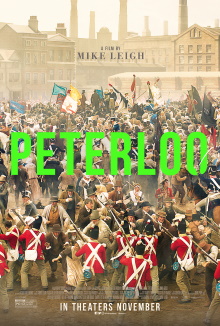
Mike Leigh is another British director of some renown but I don’t believe we’ve seen anything by him before this. Similar to Ken Loach, he is known for championing the working class in his work and the subject of this historical epic is indeed about the struggle of the British people for their voting rights in the early 19th century. Unfortunately while beautifully shot, this is a dreadfully boring work that even the most hardened of film connoisseurs will struggle to keep awake for.
The Battle of Waterloo marks the end of the Napoleonic Wars but the battered soldiers return to find a nation in the midst of an economic depression. The recently passed Corn Laws prevent the country from importing grain and so keep food prices high. Meanwhile the increasing mechanization of Manchester’s textile mills put many people out of work. They are also angry at the Prince Regent for his insouciance and indolent lifestyle. Reformers speak out for Parliamentary reform and demand annual elections to ensure that the MPs actually represent the people. The leaders in Manchester decide to ask famous orator Henry Hunt to speak at a large rally in the city. Some of the leaders argue that they must be prepared for violence but Hunt insists that the rally must be peaceful and forbids anyone from bringing weapons. The city’s magistrates are aware of the plans but decide to allow the rally to proceed in order to catch Hunt in the act of inciting rebellion, thus setting the stage for what the press would later call the Peterloo Massacre.
Despite boasting excellent production values, especially in the form of some beautiful landscape shots, this is a truly atrocious film that makes many mistakes and seems muddle-headed. For example, the opening scenes of a soldier, Joseph, returning home to Manchester and having difficulty making a living is solid work but the film then abandons this point of view and doesn’t come back to it until the day of the rally itself. Most scenes are actually dominated by the various leaders and speakers of the reform movement but it’s too much to expect that audiences will know about them and the film offers no help whatsoever. It gets a little better when it focuses on Hunt in particular but we still have very little work with. The film seems strangely intent on showing the disagreements and infighting between Hunt and some of the other leaders from Manchester, making it hard to discern if Hunt truly is that insistent on a peaceful movement or just wants to shut out other rivals in the reform movement. Similarly, Leigh really wants us to know which reporters from which newspapers were present, as if we care. The day of the rally itself comes far too near the end of the film, leaving no time at all for the aftermath. It’s a very odd set of filmmaking decisions from beginning to end, stemming I think from assuming from the onset that the audience already knows the entire history of what happened and so all the film has to do is to show the live action.
Yet by far the main reason why this film is such a chore to watch is its obsessive love of the spoken word and a firm conviction that what best represents the work of the reformers of the age are their speeches. Leigh must have been quite moved by them as he recreates several of the apparently historical speeches in full, thus explaining much of this film’s long running time. Now I enjoy a good grandstanding speech myself and I especially like it when they use words and phrases that are no longer in common usage. But there is just way, way too much of it here. What’s worse is that while there are many orators, they all essentially say the same thing with the kind of messaging that we’ve all heard before so there’s no way to differentiate between the positions and thoughts of the different reformers through what they say. Leigh even includes a letter written by a magistrate to denounce the reformers which I presume must be real as well. While it’s interesting to hear a perspective from the other side, it’s still basically stereotypical moustache-twirling villainy that makes it even more difficult to see this film as anything other than a caricature. You can’t get close to these characters and get a feel for what they were really like beneath their public faces.
Quite a few times in this blog I’ve written about how many historical epics follow a set formula that makes it difficult for them to stand out. In this case, following the usual formula would have resulted in a far better film than this one with its unwavering focus on these interminable speeches. If only it had kept going in the same vein as the early scenes showing the lives of the common folk rather than having those great orators merely talk about how they are suffering, this would have been so much better. As it is, this is truly terrible and boring and I would advise all to keep away from it.
One thought on “Peterloo (2018)”